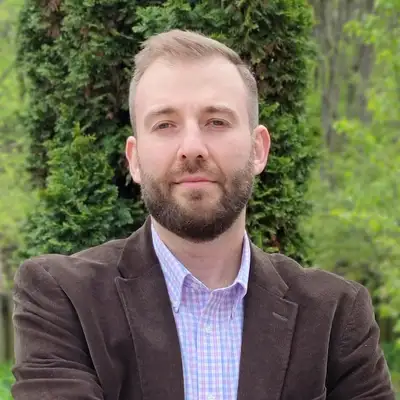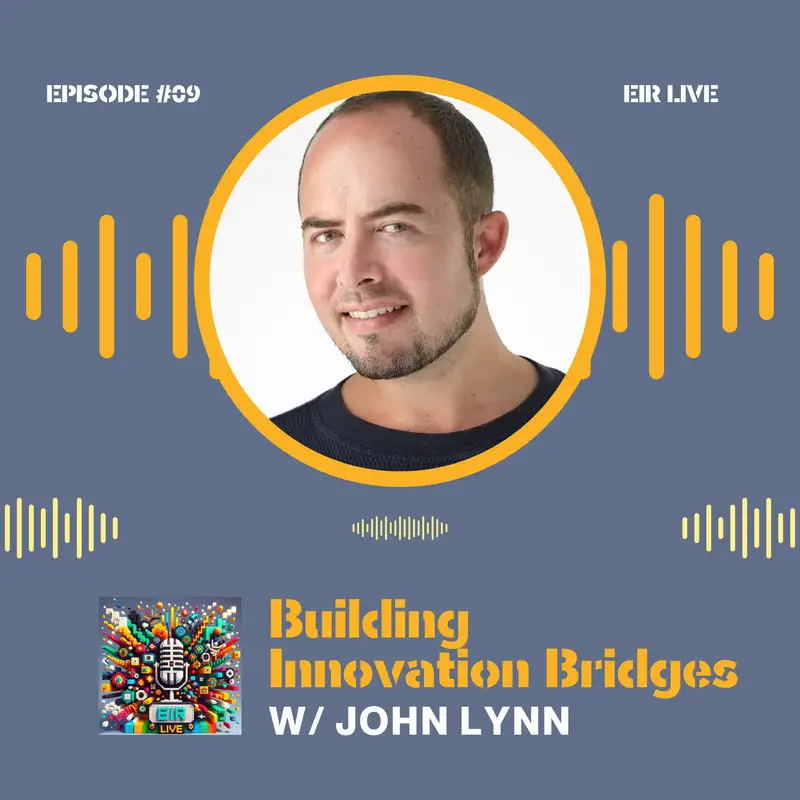Episode 09 - Building Innovation Bridges: From EIR to Accelerator Architect with John Lynn
In this episode of EIR Live, hosts Terrance Orr and Ilya Tabakh sit down with John Lynn, Co-Founder of Quay Acceleration, an accelerator-as-a-service organization. John, an experienced entrepreneur-in-residence (EIR) with an extensive background in community-driven innovation, shares his unique journey—from building international business connections in Japan to orchestrating transformative startup accelerators across corporate, governmental, and academic landscapes. This episode delves deeply into how John leverages community principles, storytelling, and strategic networks to successfully foster innovation ecosystems. Listeners gain valuable insights on effectively implementing accelerator models, harnessing sustainable self-interest, and understanding the critical role narrative plays in securing buy-in from stakeholders.
Chapters
- [00:00:00] Episode Opening - Corporate Innovation Fatigue
- [00:00:57] Podcast Introduction
- [00:01:41] Guest Introduction - John Lynn
- [00:02:32] John's Background and Quay Acceleration
- [00:04:08] John's International Experience Introduction
- [00:04:55] First Startup Experience in Japan
- [00:08:28] Community Building and Accelerator Methodology
- [00:09:00] Power of Sustainable Self-interest
- [00:11:51] Transition into Techstars
- [00:16:31] The Importance of Storytelling
- [00:17:55] MVP Development and Hustle Culture
- [00:26:19] KJ Singh and Techstars Experience
- [00:28:07] First EIR Role Journey
- [00:34:07] EIR Roles and Different Structures
- [00:38:52] Building Sustainable Innovation Ecosystems
- [00:42:31] Government and Community-led Accelerators
- [00:49:56] Ideal Structure for EIR Roles
- [00:52:04] Closing Thoughts on Providing Networks Over Ideas
Key Takeaways
- Successful innovation ecosystems rely heavily on understanding and harnessing community dynamics and sustainable self-interest
- Storytelling is critical for startup success, enabling founders to inspire stakeholders beyond just presenting data points
- MVP strategies, even if analog or basic, can be highly effective and cost-efficient ways to validate market fit and engage early adopters
- Government and local communities are increasingly critical in supporting and driving innovation ecosystems post-pandemic
- The best support EIRs can offer entrepreneurs involves leveraging their network to provide tangible access and opportunities
Notable Quotes
- "Selfishness and selflessness equally poor foundations for a community. Great communities thrive on give and take." [00:09:33] - John Lynn
- "Storytelling is a superpower. It's not about getting someone to trust you—it's about inspiring them." [00:17:25] - John Lynn
- "The real reason an MVP is effective is not because it's cheap, but because it's fair to your customer." [00:24:16] - John Lynn
- "Next time you talk to an entrepreneur, don't give them your ideas—give them your network." [00:52:04] - John Lynn
Organizations & Resources Mentioned
Connect with John Lynn
- LinkedIn: John Lynn
- Website: Quay Acceleration
Connect with EIR Live:
- Terrance Orr on LinkedIn: linkedin.com/in/terranceorr
- Ilya Tabakh on LinkedIn: linkedin.com/in/ilyatabakh
- Website: eir.live
- LinkedIn: linkedin.com/company/eirlive
- YouTube: youtube.com/@EIRLive
- Twitter: twitter.com/EIRLive_show
- Suggest Guest
Creators and Guests

Host
Ilya Tabakh
Infrastructure Innovation Strategist | Building the Future of AI & Energy Systems | Co-host @ EIR Live & Powering the AI Stack 🎙️

Host
Terrance Orr
EIR & Fractional Executive | Strategic Advisor | Founder-CEO Coach | Ecosystem Builder | Co-Host, EIR Live🎙️

Guest
John Lynn
John Lynn is a serial entrepreneur and co-founder of Quay Acceleration (formerly cela), where he has built over 60 startup accelerators for corporations, governments, and universities including Google, IBM, SAP, and Barclays. With experience as a multi-time Entrepreneur-in-Residence and accelerator architect, he specializes in creating innovation ecosystems that connect entrepreneurs with the networks, resources, and support systems they need to succeed.

